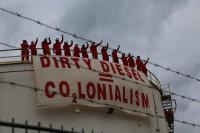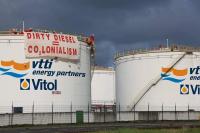On Saturday morning, a group of 25 people entered the terrain of gasoline trader Vitol in the Amsterdam harbour, forcing a suspension of all activities on the terrain. Their message: Stop the export of toxic gasoline to West-Africa – and end the era of fossil fuels.
Report on Toxic Gasoline
The direct incentive for the blockade is a report released last September by the Swiss watchdog Public Eye. This report concluded that companies such as the Dutch Vitol, the largest gasoline trader in the world, are responsible for dumping toxins on West-African countries via the ports of Amsterdam and Rotterdam. Companies such as Vitol add pollutants to gasoline and diesel, the sulphur and benzene levels in these mixtures exceed European standards, reaching levels three hundredfold higher than allowed in European countries. Combustion of these fuels can lead to severe health problems and even premature death. These fuels are commonly referred to as ‘African Quality’.
Ending the era of fossil fuels
Right now the activists of Climate Justice Amsterdam are targeting the entire fossil fuel industry in the harbours of Amsterdam and Rotterdam: “At this point, no one can deny climate change is happening. But after 22 years of climate conferences of the United Nations, global greenhouse emissions are still rising. The Dutch carry a great responsibility for the disaster that we see unfolding before our eyes, because the largest European oil and coal harbours are located in Amsterdam and Rotterdam. Many people are not aware of the urgency of the crisis, partly because politicians are pretending to have ambitious plans to combat climate change. In reality these words are empty, serving to keep the population quiet. With our action, we are trying to wake up society: rise up! Only mass resistance will be able to turn the tide and stop the era of fossil fuels.”
Climate justice
Climate Justice Amsterdam argues for a different approach to climate change, based on justice and tackling the underlying causes: “Climate change is not only about CO2 and fossil fuels, it is an ethical and political problem as well. The wealthiest 10% of the population are responsible for half of the total global greenhouse emissions. Eventually, all of us will be affected by climate change, but at this point the people least responsible are paying the highest price. At the same time these communities are also the most defenceless. Therefore, climate change is a form of structural violence that cannot be seen apart from historically developed social and economic inequality. To tackle this crisis in a successful and just way, we have to identify the underlying causes. Why are living under an economic system that is blind to ethical and moral reasoning, which is playing Russian roulette with the planet, human lives and our collective future in its never-ending race to increase profits?”
Turmoil but no stop on exports
Dutch minister Lilianne Ploumen (Foreign Affairs) called it ‘a dirty scandal’ when companies are, with full knowledge, exporting toxic fuels to African countries. Several political parties (PvdA, SP, GroenLinks and ChristenUnie) in the Dutch House of Representatives declared that they wanted a stop on the export of heavy polluting fuels via the harbours of Amsterdam and Rotterdam. SP, PvdA and Groenlinks also expressed strong criticism in the Amsterdam City Council. PvdA-councillor Carolien de Heer called for a moral judgement by the harbour: “you should not want to be involved in certain practices.”
According to Climate Justice Amsterdam these statements have not lead to any consequences for the responsible parties. “This is a downright scandal, even more so since legal analysis from the Centre for International Environmental Law has concluded that the Dutch state is violating international treaties by not preventing the export of dirty diesel and gasoline. The Basel Convention lists these fuels as ‘hazardous waste’ and the Bamako Convention prohibits its export. Even without considering these legal judgements, the export of dirty diesels is ethically unjust, causing the premature death of tens of thousands of people and inestimable human suffering. After the short moment of turmoil in response to the Public Eye report last year, nothing has changed: Vitol is still maximising its profits at the cost of the health of African citizens,” according to spokesperson Hannah de Haan.
Press spokesperson:
Hannah de Haan & Tim Peters – +31 6 8366 3522 climatejustice020@riseup.net
Twitter:
@CO2justice #dirtydiesel #gifbenzine
Pictures:
https://www.flickr.com/photos/climatejustice020/
Background information:
The Guardian: Trafigura, Vitol and BP exporting dirty diesel to Africa, says Swiss NGO
CIEL: Netherlands and Belgium Violate International Law by Allowing the Export of Dirty Petrol and Diesel


